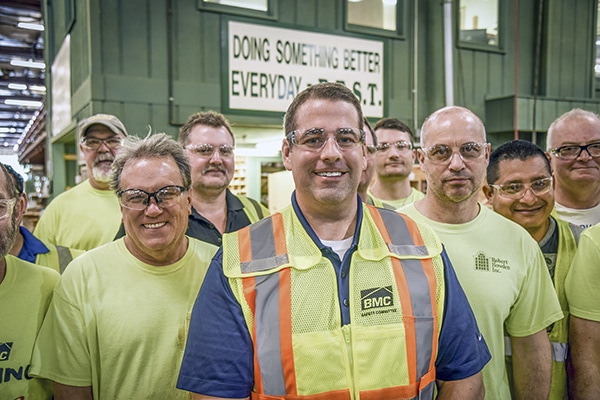When BMC Holdings merged with Stock Building Supply in 2015, Mike Farmer had to act fast.
It’s not that the merger came as a surprise. Having then worked for the company for nine years, Farmer already knew that the construction companies were a good fit for each other, both culturally and geographically (with Stock headquartered in Raleigh, North Carolina, and BMC based in Atlanta, with a dominant presence on the West Coast). In fact, a merger had been discussed as far back as 2006. But, once speculation became reality, both companies experienced a surge in growth that was formidable, to say the least, regardless of the transaction’s predictability.
“We were going from a $1.5 billion company to a $3 billion company, so we really had to work to form teams that were capable of managing that scope,” says Farmer, who started out as a regional HR manager in 2006 and now serves as BMC’s senior vice president of human resources. “We needed to think where we had the right talent and where we wanted to build out talent. We new we had really good people, and our first goal was to make sure we had everyone in the right roles. Now we are laser focused on succession planning and associate development.”

Farmer’s approach to a smooth transition involved a mixture of cultural surveys and face-to-face culture-building events for the newly formed company. Working with a team made up of employees from both of BMC’s legacy businesses, Farmer then put initiatives in place to tackle localized issues, especially in areas where employees wanted more feedback and opportunities for individual growth. He also began traveling to different offices to get an ear to the ground, and he estimates that he spent 75 percent of his time on the road during the first two years of the merger. “It was important for me to get out to our markets, to listen and build relationships with our team,” he says. “We needed to make sure that we understood what our local markets needed, and we needed them to know that they could call us at any time.”
The senior leadership team also led “Better Together” appreciation events in every location—on the same day, across the company—one year into the merger, to focus on culture and communication. The events included new mission, vision, and values posters, associate giveaways, and company videos, and they added a spirit of fun, in line with BMC’s culture.
Having worked primarily with the corporate leadership team, along with five divisional vice presidents at the beginning, Farmer discovered that some of their decisions didn’t necessarily translate into what was needed in the field. So, six months after the merger, he created the Leadership Voices, a group and program that drew in market leaders from each of their divisions for feedback, in addition to functioning as a sounding board for all field operations. “We tried to choose people who were influential but could also give us really good, honest feedback around how to best help lead change for the organization,” Farmer says.
The group was an immediate success. “Their insights were very helpful for change management and also made a big impact on enabling things to go much more smoothly,” Farmer says. This led him to look into more opportunities where employees could have a greater voice in the company. After doing some case research, he created the Leadership Development Program, which brings market leaders together for discussions about what BMC Stock Holdings is hoping to accomplish from financial, cultural, and leadership standpoints. Farmer later split the areas into different groups to come up with solutions for a variety of business challenges.
After launching the program with a cross-sampling of market managers and receiving positive feedback, Farmer began repeating it on a rotating basis, bringing new groups of team members together for events focused on leadership, culture, and change management. “It’s been a powerful way to get our teams engaged,” Farmer says. “It’s helped increase communication locally, but it’s also helped to speed up the change process because they can see that we are listening.”
Dallas–Fort Worth Market Manager Dan Schau says it was rewarding to be in the group because its members were able to help shape the new organization by providing their own thoughts on how best to do so.
Since then, Farmer and his team have focused on bringing members of BMC’s leadership together through various initiatives, including regular town halls and servant leadership management training. Shortly after the merger, Farmer also helped promote BMC’s longstanding fundraising initiatives for the Leukemia and Lymphoma Society, which enabled team members to rally around a united messaging platform. BMC also partnered with Applied Vision Works to launch its updated Leadership Development Program, which provides a foundation for all leaders within BMC.
As a result, BMC Stock Holdings has become cohesive as a culture over a relatively short period of time. “Our teams are more engaged, and we’re all speaking the same language,” Farmer says, adding that BMC’s first quarter of 2018 was very successful. “We are on a path of continuous improvement. We know we won’t get everything right out of the gate, but we are committed to listening, and we are committed to our people and our customers. That is the recipe for success.”
He also credits the team members. “Mergers are difficult,” he says. “You need to make a lot of decisions, and that can take a toll on people. But, the resiliency, tenacity and camaraderie of our teams showed through. And that matters, because our people are our most important asset.”


